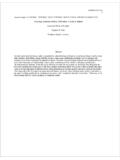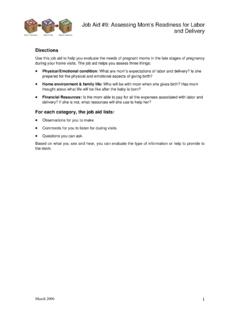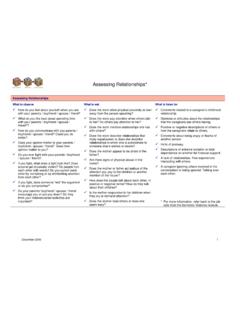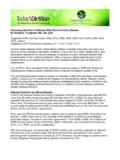Transcription of ASSESSING QUALITY, OUTCOME AND …
1 Workshop on Global health Workforce Strategy Annecy, France, 9-12 December 2000. ASSESSING quality , OUTCOME . AND performance . MANAGEMENT. Dr Javier Martinez The Institute for health Sector Development London world health organization Department of organization of health Services Delivery Geneva Switzerland 2001. world health organization , 2001. This document is not a formal publication of the world health organization (WHO), and all rights are reserved by the organization . The document may, however, be freely reviewed, abstracted, reproduced and translated, in part or in whole, but not for sale nor for use in conjunction with commercial purposes. ASSESSING quality , OUTCOME and performance management Dr Javier Martinez The Institute for health Sector Development London Contents Introduction.
2 1. 1. Background, objectives and methods .. 1. 2. Mapping out the topic and this review .. 1. Chapter 1 What is performance management? How have the concept and practice of performance management evolved over time? .. 3. Definition .. 3. How have the concept and practice of performance management evolved in recent years? .. 4. From tools to system, and from system to process .. 6. From individual appraisal to joint review .. 6. From outputs' to outputs and inputs' .. 7. From reward orientation to staff development .. 7. From ratings common' to less rating', and from monolithic to flexible .. 8. From top down' to 360 degree feedback', and from directive to supportive .. 8. From owned by human resources managers' to owned by users' .. 9. From professional-based to service-based performance management.
3 9. Chapter 2 How is performance Management being applied to health care organizations? What are the main models, methods and indicators used? . 10. performance management in the public sector and in national health systems .. 10. Setting up performance management systems .. 11. Dimensions and approaches to performance management in health care taken from the British National health Service .. 11. performance Standards and Indicators .. 13. Chapter 3 What are the essential prerequisites for introducing performance management to national health systems? .. 14. Do health Care Organizations need performance Management? .. 14. Prerequisites for introducing performance management in health care organizations .. 15. Organizational (internal) prerequisites .. 15. Adequate pay levels.
4 15. Equipment, tools and skills to do the job .. 16. The right balance of incentives for staff to perform well .. 16. Local autonomy and decision making .. 17. Familiarity with planning methods .. 18. Effective communications .. 18. Leadership and effective management systems .. 19. A culture of accountability and openness .. 19. Gender issues .. 20. External pressures and triggers facilitating performance management .. 20. Political pressure and health care reforms .. 21. Financial pressures .. 21. Introduction of purchaser/provider split and service agreements .. 21. Decentralization .. 22. Pressure from service users and quality assurance .. 22. ASSESSING quality , Workshop OUTCOME on Global and performance health Workforce management Strategy INTRODUCTION. 1. Background, objectives and methods This is one in a series of papers commissioned to provide an up-to-date overview of human resource issues within the health sector.
5 The objective of each paper is that it will provide a summary of the current state of knowledge and understanding in the theme area, taking stock of the current evidence base in terms of what works, what does not and why. Significant gaps in the knowledge base should also be identified. The specific questions to be addressed in this paper are: What is the evidence and what are the valid methods for improving the quality of care and outcomes through the use of human resources interventions? What are the different models of human resources related to quality improvement and perform- ance management systems in the health sector at national/strategic level and at local/opera- tional level? How are human resources performance indicators at national and operational levels derived, applied and used?
6 What are the methods used to assess the performance of individual workers and teams in health care? In addition to available materials, the author browsed several websites and publications and selected relevant. A complete set of the references and bibliography used can be found at the end of this docu- ment, together with a list of the main journals and websites reviewed. It must be said that there is still a very limited amount of published literature on the introduction of performance management in health care organizations, and even less so in the context of health systems from developing countries. The author has therefore also used unpublished materials that are also referenced in the bibliography section. 2. Mapping out the topic and this review performance management is or should be an eminently practical process closely aligned with other aspects of general management, and does not sit easily as an isolated subject for academic scrutiny.
7 For example, much of the literature from the 80s and early 90s makes a separation between quality a service OUTCOME - and performance a human resource OUTCOME . In practice, such separation does not seem to make sense, since both performance management and quality enhancement ultimately rely on human resource interventions, and both pursue the goal of delivering better services. This review will focus on the use of performance management an increasingly popular human resource intervention as a means to improve the quality and outcomes of health care. The approaches used to improve staff performance and increase service quality are many and have quickly become an integral part of general management theory and practice. These include quality Assurance, quality Audit, Total quality Management, quality Cycles, Benchmarking, Accreditation, Certification, and performance Appraisal, among others.
8 These approaches in turn share some of the tools used to ensure quality , such as treatment protocols, definition of quality standards, user satisfaction surveys, or personal development plans, among many others. All these approaches require the introduction of human resource interven- tions of one type or another since they all ultimately rely on the skills, motivation and performance of health care professionals. 1. Workshop on Global health Workforce Strategy This review will attempt to cover the topic by answering 3 main questions: 1. What is performance management? How have the concept and practice of performance manage- ment evolved over time? 2. How is performance management being applied to health care organizations? What are the main models, approaches and indicators used?
9 3. What are the essential prerequisites for applying performance management to national health sys- tems? Chapter 1. What is performance management? How have the concept and practice of performance management evolved over time? 2. ASSESSING quality , OUTCOME and performance management Chapter 1. What is performance management? How have the concept and practice of performance management evolved over time? Definition performance management is a term borrowed from the management literature that has only recently been adopted in the health care field. The term performance management was first used in the 1970s, but it did not become a recognised process until the latter half of the 1980s (Armstrong & Baron, 1998). The meaning of performance management has evolved and continues to evolve.
10 While in the sixties and seventies performance management was often equated to some form of merit-rating, in the eighties and nineties it has been linked to new management paradigms such as Management by Objectives, Per- formance Appraisal, Behaviourally Anchored Rating Scales and performance -related Pay. Even today, authors differ in their understanding of performance management. The following definitions allow us to view the changes that the concept of performance management has undergone during the 1990s. Fowler (1990) defines performance management as: ..the organization of work to achieve the best possible results. From this simple viewpoint, performance management is not a system or technique, it is the totality of the day-to-day activities of all managers . The (then) Institute of Personnel Management (1992) produced a similar definition: A strategy which relates to every activity of the organization set in the context of its human resources policies, culture, style and communications systems.















